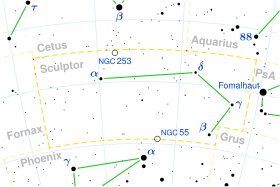Alpha Sculptoris

| |
| Observation data Epoch J2000.0 Equinox J2000.0 | |
|---|---|
| Constellation | Sculptor |
| Right ascension | 00h 58m 36.35930s[1] |
| Declination | −29° 21′ 26.8247″[1] |
| Apparent magnitude (V) | +4.30[2] |
| Characteristics | |
| Spectral type | B7 IIIp[3] |
| U−B color index | −0.515[4] |
| B−V color index | −0.155[4] |
| Variable type | SX Ari[5] |
| Astrometry | |
| Radial velocity (Rv) | +10.2[2] km/s |
| Proper motion (μ) | RA: +20.13[1] mas/yr Dec.: +5.31[1] mas/yr |
| Parallax (π) | 4.20 ± 0.18[1] mas |
| Distance | 780 ± 30 ly (240 ± 10 pc) |
| Details | |
| Mass | 5.01[6] M☉ |
| Radius | 7.52[7] R☉ |
| Luminosity | 1,549[6] L☉ |
| Surface gravity (log g) | 3.20[8] cgs |
| Temperature | 13,600[8] K |
| Metallicity [Fe/H] | 0.90[9] dex |
| Rotational velocity (v sin i) | 17[8] km/s |
| Age | 93[6] Myr |
| Other designations | |
| Database references | |
| SIMBAD | data |
Alpha Sculptoris (α Scl, α Sculptoris) is the Bayer designation for a star in the southern constellation of Sculptor. It has an apparent visual magnitude of +4.30,[2] which makes it the brightest star in this generally faint constellation. Parallax measurements collected during the Hipparcos mission provide a distance estimate for this star, placing it at roughly 780 light-years (240 parsecs), with a 4% margin of error.[1]
Alpha Sculptoris is a blue-white B-type giant. It is classified as an SX Arietis type variable star and its magnitude varies by less than a tenth of a magnitude.[5]
The luminosity of α Scl is around 1,500 times that of the Sun while its surface temperature is 13,600 K. The radius of Alpha Sculptoris is calculated to be seven times solar while its mass is five times that of the Sun.
References
- 1 2 3 4 5 6 van Leeuwen, F. (November 2007). "Validation of the new Hipparcos reduction". Astronomy and Astrophysics. 474 (2): 653–664. Bibcode:2007A&A...474..653V. arXiv:0708.1752
 . doi:10.1051/0004-6361:20078357.
. doi:10.1051/0004-6361:20078357. - 1 2 3 Wielen, R.; et al. (1999), "Sixth Catalogue of Fundamental Stars (FK6). Part I. Basic fundamental stars with direct solutions", Veröff. Astron. Rechen-Inst. Heidelb, Astronomisches Rechen-Institut Heidelberg, 35 (35), Bibcode:1999VeARI..35....1W
- ↑ Houk, Nancy (1979), "Michigan catalogue of two-dimensional spectral types for the HD stars", Michigan Catalogue of Two-dimensional Spectral Types for the HD stars. Volume_3. Declinations -40_ƒ0 to -26_ƒ0, Ann Arbor, Michigan: Dept. of Astronomy, University of Michigan, 3, Bibcode:1982MSS...C03....0H
- 1 2 Gutierrez-Moreno, Adelina; et al. (1966), "A System of photometric standards", Publ. Dept. Astron. Univ. Chile, Publicaciones Universidad de Chile, Department de Astronomy, 1: 1–17, Bibcode:1966PDAUC...1....1G
- 1 2 Samus, N. N.; Durlevich, O. V.; et al. (2009). "VizieR Online Data Catalog: General Catalogue of Variable Stars (Samus+ 2007-2013)". VizieR On-line Data Catalog: B/gcvs. Originally published in: 2009yCat....102025S. 1. Bibcode:2009yCat....102025S.
- 1 2 3 Kochukhov, O.; Bagnulo, S. (2006). "Evolutionary state of magnetic chemically peculiar stars". Astronomy and Astrophysics. 450 (2): 763. Bibcode:2006A&A...450..763K. doi:10.1051/0004-6361:20054596.
- ↑ Shulyak, D.; Paladini, C.; Causi, G. Li; Perraut, K.; Kochukhov, O. (2014). "Interferometry of chemically peculiar stars: Theoretical predictions versus modern observing facilities". Monthly Notices of the Royal Astronomical Society. 443 (2): 1629. Bibcode:2014MNRAS.443.1629S. doi:10.1093/mnras/stu1259.
- 1 2 3 Saffe, C.; Levato, H. (2014). "On the nature of sn stars. I. A detailed abundance study". Astronomy & Astrophysics. 562: A128. Bibcode:2014A&A...562A.128S. arXiv:1401.5764
 . doi:10.1051/0004-6361/201322091.
. doi:10.1051/0004-6361/201322091. - ↑ Schmitt, A. (March 1973), "The weak-helium-line star α Sculptoris. I. The line-spectrum", Astronomy and Astrophysics Supplement, 9: 427, Bibcode:1973A&AS....9..427S
- ↑ "alf Scl -- Rotationally variable Star", SIMBAD Astronomical Object Database, Centre de Données astronomiques de Strasbourg, retrieved 2012-04-08